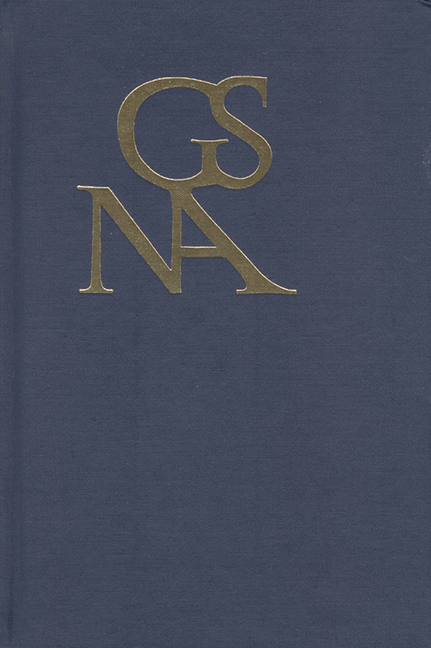Book contents
- Frontmatter
- Contents
- Special Section on What Goethe Heard, edited by Mary Helen Dupree
- What Goethe Heard: Special Section on Hearing and Listening in the Long Eighteenth Century
- Behind Herder's Tympanum: Sound and Physiological Aesthetics, 1800/1900
- Becoming the Listener: Goethe's “Der Fischer”
- Of Barks and Bird Song: Listening in on the Forgotten in Ludwig Tieck's Der blonde Eckbert
- Garden Empire or the Sublime Politics of the Chinese-Gothic Style
- Die Austreibung des Populären: Schillers Bürger-Kritik
- Goethe and the Uncontrollable Business of Appropriative Stage Sequels
- Repetition and Textual Transmission: The Gothic Motif in Goethe's Faust and “Von deutscher Baukunst”
- “Die gewalt'ge Heldenbrust”: Gender and Violence in Goethe's Iphigenie auf Tauris
- Literary Form and International World Order in Goethe: From Iphigenie to Pandora
- Two Gifts from Goethe: Charlotte von Stein's and Charlotte Schiller's Writing Tables
- Goethe's Wilhelm Meister and the Refusal to Grow Up: The Dialectics of Bildung
- “So steh' ich denn hier wehrlos gegen dich?”— Figures of Armament and Disarmament in German Drama before and after the French Revolution
- Goethe, Maimon, and Spinoza's Third Kind of Cognition
- Die Neuvermessung von Lyrik und Prosa in Goethes Novelle
- Book Reviews
Of Barks and Bird Song: Listening in on the Forgotten in Ludwig Tieck's Der blonde Eckbert
from Special Section on What Goethe Heard, edited by Mary Helen Dupree
Published online by Cambridge University Press: 16 May 2018
- Frontmatter
- Contents
- Special Section on What Goethe Heard, edited by Mary Helen Dupree
- What Goethe Heard: Special Section on Hearing and Listening in the Long Eighteenth Century
- Behind Herder's Tympanum: Sound and Physiological Aesthetics, 1800/1900
- Becoming the Listener: Goethe's “Der Fischer”
- Of Barks and Bird Song: Listening in on the Forgotten in Ludwig Tieck's Der blonde Eckbert
- Garden Empire or the Sublime Politics of the Chinese-Gothic Style
- Die Austreibung des Populären: Schillers Bürger-Kritik
- Goethe and the Uncontrollable Business of Appropriative Stage Sequels
- Repetition and Textual Transmission: The Gothic Motif in Goethe's Faust and “Von deutscher Baukunst”
- “Die gewalt'ge Heldenbrust”: Gender and Violence in Goethe's Iphigenie auf Tauris
- Literary Form and International World Order in Goethe: From Iphigenie to Pandora
- Two Gifts from Goethe: Charlotte von Stein's and Charlotte Schiller's Writing Tables
- Goethe's Wilhelm Meister and the Refusal to Grow Up: The Dialectics of Bildung
- “So steh' ich denn hier wehrlos gegen dich?”— Figures of Armament and Disarmament in German Drama before and after the French Revolution
- Goethe, Maimon, and Spinoza's Third Kind of Cognition
- Die Neuvermessung von Lyrik und Prosa in Goethes Novelle
- Book Reviews
Summary
IN GRAMMOPHON. FILM. TYPEWRITER (1986), Friedrich Kittler cites in its entirety a fantastical tale by Maurice Renard, originally entitled “La mort et le coquillage” (Death and the Shell, 1907), in which an accomplished composer, Nerval, attempts one night to transcribe the sounds he hears from a seashell. Despite being “among the most famous” of composers, Nerval is unable to transcribe the mysterious sounds “dictated” to him, and later that night—perhaps after recognizing the impossibility of his task—he dies. The entire story of Nerval's death is narrated by one of his friends, left unnamed, who throughout the short story describes the night's events to Nerval's doctor. The friend wants to convince the doctor that his diagnosis for Nerval's death, a stroke, was incorrect. What killed Nerval, according to his friend, was putting his ear to the seashell, a fate that the friend thinks he will soon share himself:
Do you believe that there are poisons for the ear modeled on deadly perfumes and lethal potions? Ever since last Wednesday's auditory event [l'audition] I have not been feeling well. It is my turn to go … Poor Nerval! … Doctor, you claim he died of a stroke … and what if he died because he heard the sirens singing? Why do you laugh?
Laughter is the only indication of the doctor's response to the story as a whole, to which Kittler responds that “als Schlußsatz einer phantastischen Erzä hlung gab es schon bessere Fragen” (Kittler 87; “there have been better questions to conclude fantastic tales,” 55). Not unreasonably, Kittler aligns Renard's fantastical tale with contemporaneous technical manuals that describe phonographs, graphophones and other early sound recording instruments as being able to bring back the dead, going so far as to propose that “[die] Muschel, der Renards fiktiver Komponist lauscht, … nicht am Strand einer Natur gefunden [ist]; sie vertritt die Muschel eines Telephons oder Fernsprechers, der Zeitenfernen ü berbrü cken kann, um ihn an eine Antike vor jedem Diskurs anzuschließen” (Kittler 88; “The shell that Renard's fictitious composer listens to was not found on a natural beach; it takes the place of the mouthpieces of a telephone or a loudspeaker capable of bridging temporal distances in order to connect him with an antiquity preceding all discourse,” 55).
- Type
- Chapter
- Information
- Goethe Yearbook 25Publications of the Goethe Society of North America, pp. 55 - 76Publisher: Boydell & BrewerPrint publication year: 2018



